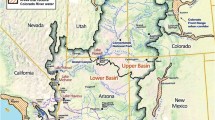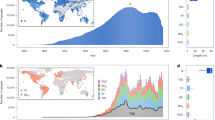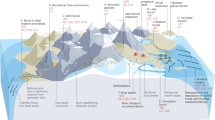Abstract
Acid precipitation and the consequent increased acidity of fresh waters are subjects of widespread concern. Several organizations in the United States, Canada and Europe have established extensive monitoring programmes in an attempt to determine the relationship between the acidity of preciptation and the change in acidity of fresh waters. We contend here that the present strategies for monitoring temporal trends in the acidity of fresh waters will not yield results sensitive enough to detect trends in acidity even on a 10-year timescale. We propose here an alternative scheme based on calculations using precise measurements of dissolved inorganic carbon (DIC) and partial pressure of CO2 ()· This scheme eliminates biases inherent in pH electrode determinations and minimizes the perturbations in acidity caused by changes in the of lake waters associated with biological cycles.
This is a preview of subscription content, access via your institution
Access options
Subscribe to this journal
Receive 51 print issues and online access
$199.00 per year
only $3.90 per issue
Buy this article
- Purchase on Springer Link
- Instant access to full article PDF
Prices may be subject to local taxes which are calculated during checkout
Similar content being viewed by others
References
McQuaker, N. R., Kluckner, P. D. & Sandberg, D. K. Envir. Sci. Technol. 17, 431–435 (1983).
Brezinski, D. P. Analyst 108, 425–442 (1983).
Brezinski, D. P. Talanta 30, 347–354 (1983).
Herczeg, A. L. & Hesslein, R. H. Geochim cosmochim. Acta 48, 837–845 (1984).
Covington, A. K., Whalley, P. D. & Davison, W. Analyst 108, 1528–1532 (1983).
Tyree, S. Y. Atmos. Envir. 5, 57–60 (1981).
Schindler, D. W. et al. Science 177, 1192–1195 (1972).
Emerson, S. Limnol. Oceanogr. 20, 743–753 (1975).
Talling, J. F. J. Ecol. 64, 79–122 (1976).
Stumm, W. & Morgan, J. J. Aquatic Chemistry. An Introduction Emphasizing Chemical Equilibria in Natural Waters 2nd edn, Ch. 4 (Wiley, New York, 1981).
Stainton, M. P., Capel, M. J. & Armstrong, F. A. J. Can. Fish. Mar. Ser. Miscell. Spec. Publ. 25, 1–180 (1977).
Beck, K. C. Reuter, J. H. & Perdue, E. M. Geochim. cosmochim. Acta 38, 341–364 (1974).
Brossett, C. Wat., Air, Soil Pollut. 14, 251–265 (1980).
Driscoll, C. T. & Bisogni, J. J. in Modeling of Total Acid Precipitation Impacts (ed. Schnoor, J. L.) 53–72 (Ann Arbor Science, Ann Arbor, 1984).
Oliver, B. G., Thurman, E. M. & Malcolm, R. L. Geochim. cosmochim. Acta 47, 2031–2036 (1983).
Purdue, E. M., Reuter, J. H. & Parrish, R. S. Geochim. cosmochim. Acta 48, 1257–1263 (1984).
Author information
Authors and Affiliations
Rights and permissions
About this article
Cite this article
Herczeg, A., Broecker, W., Anderson, R. et al. A new method for monitoring temporal trends in the acidity of fresh waters. Nature 315, 133–135 (1985). https://doi.org/10.1038/315133a0
Received:
Accepted:
Issue Date:
DOI: https://doi.org/10.1038/315133a0
This article is cited by
-
A simple approach to estimate daily loads of total, refractory, and labile organic carbon from their seasonal loads in a watershed
Environmental Science and Pollution Research (2018)
-
Seasonal pattern of dissolved organic matter (DOM) in watershed sources: influence of hydrologic flow paths and autumn leaf fall
Biogeochemistry (2014)
-
Storm event patterns of particulate organic carbon (POC) for large storms and differences with dissolved organic carbon (DOC)
Biogeochemistry (2014)
-
Dissolved organic matter (DOM) concentration and quality in a forested mid-Atlantic watershed, USA
Biogeochemistry (2012)
-
Sources of CO2 evasion from two subtropical rivers in North America
Biogeochemistry (2010)
Comments
By submitting a comment you agree to abide by our Terms and Community Guidelines. If you find something abusive or that does not comply with our terms or guidelines please flag it as inappropriate.



